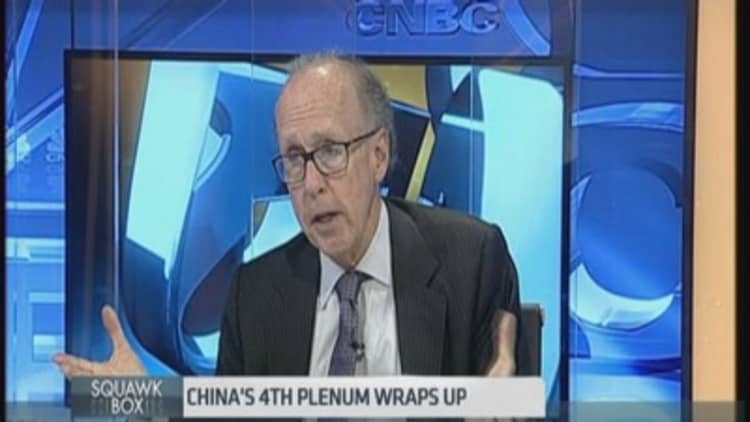China's top leaders wrapped up their four-day Fourth Plenum on Thursday, promising to enhance the rule of law in the world's second largest economy.
While details on reforms are set to emerge in the coming days, the communique released after the key meeting provided a glimpse into how the ruling Community Party plans to build a fairer and cleaner legal system.
The communique revealed steps for increasing the independence of the judicial system and improving the accountability of government officials.
"The Fourth Plenum is a key milestone in promoting rule of law," said Tommy Xie, economist at OCBC Bank told CNBC.
Read MoreChina's reforms reducing hard landing risk: Premier Li
To improve court independence and reduce interference by the local governments, the Supreme Court will set up circuit courts to facilitate the handling of judicial cases filed by citizens.
The government said it will try to recruit "lawmakers, judges and prosecutors who are qualified lawyers and law experts." Currently, many judges and court officials are selected more for their loyalty to the Party than for their competence.
To promote transparency of government affairs, a system will be set up to keep a record of officials interfering with judicial cases. They will be named publicly and held accountable.
Read More
Such reforms have the potential to boost confidence among businesses and investors in China, say economists, but will depend on how forcefully they are implemented.
"We believe [the plenum] is an important step for promoting the rule of law in China which is important for long-term sustainable growth. The challenge, however, is implementation," said Chang Chun Hua, economist at Nomura.

So far, the government has demonstrated a fair amount of commitment to following through with its reform agenda. One area where President Xi Jinping has demonstrated particular resolve is fighting corruption.
As part of the ongoing graft crackdown, the plenum expelled several high-ranking officials from the Party including former vice minister of public security Li Dongsheng, former head of the state asset regulator Jiang Jiemin and former deputy head of state energy giant China National Petroleum Corporation Wang Yongchun.
Read MoreChina takes anti-corruption drive overseas
The party, however, remained mum on the fate of Zhou Yongkang, the former security chief, who is currently under an anti-corruption probe.
Inspite of this, economists say the fourth plenum on the whole signals that China's moving in the right direction.
"China's such a big country, legal reform will be gradual and take some time. So we'll wait and see," said Xie of OCBC.


